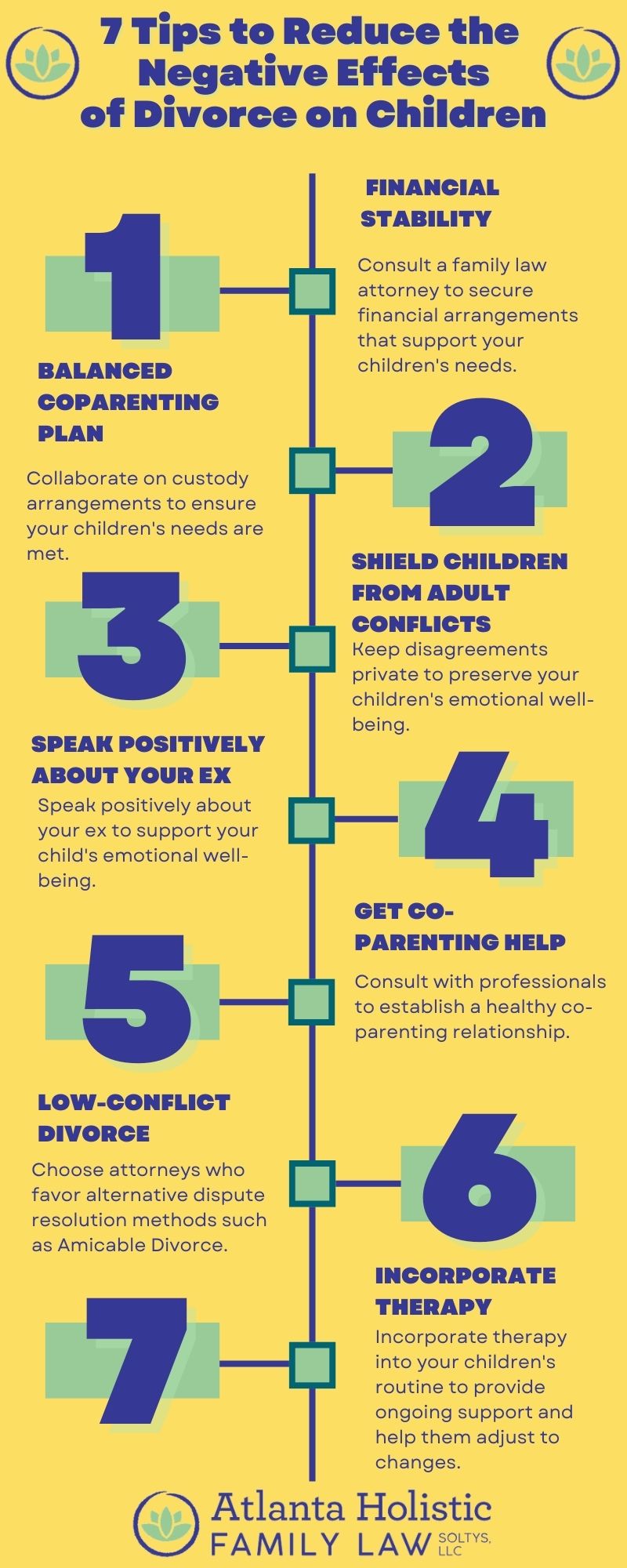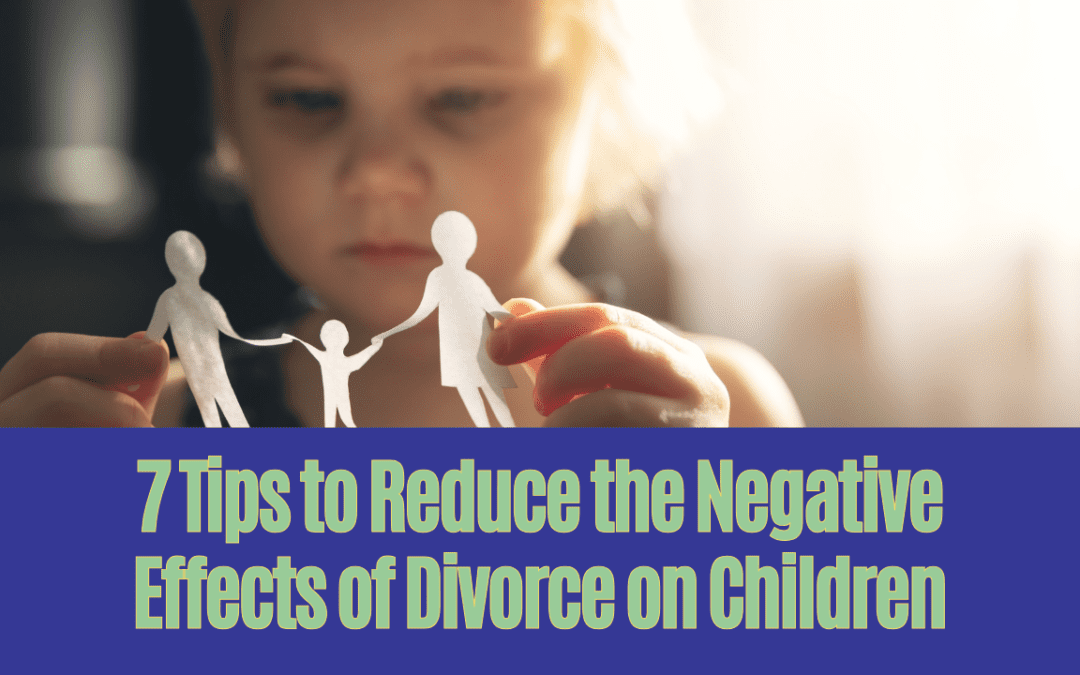Divorce is not just a transition between two adults; it profoundly affects the entire family structure. Many children experience significant emotional and psychological changes during this time. As parents, it’s natural to worry about the effects of divorce on children. The good news is that there are proven strategies to minimize the negative effects on children, ensuring they continue to feel loved, secure, and valued during this challenging time.
This post delves into seven key tips that can help you navigate the complexities of parental divorce with your child’s emotional and psychological well-being at the forefront. From maintaining financial stability to encouraging therapy, these strategies are designed to support your children’s needs and help them emerge from this transition stronger and more resilient.
Tip 1: Prioritize Financial Stability
When addressing financial stability, it’s crucial to consider the varied family structures that children find themselves in post-divorce. Whether children are living primarily with one parent, alternating between homes, or in other arrangements, each scenario presents unique financial challenges.
For children whose parents are navigating separation and divorce, the shift in routine can significantly impact their day-to-day life. In divorced families, the primary custodian often faces the dual challenge of single-handedly managing finances while providing for the child’s needs.
This change can affect not only the physical living conditions but also the overall quality of life, including access to education and extracurricular activities. Ensuring financial stability is about adapting to these new family dynamics and securing a future where children can thrive despite the changes in their household
To ensure financial stability for your children during and after the divorce, a practical and tangible step is to consult with a family law attorney. An attorney can provide crucial guidance on how to navigate the financial aspects of divorce. They can help in understanding and negotiating fair settlements or child support arrangements, ensuring that the children’s needs are given priority.
Tip 2: Develop a Balanced Coparenting Plan
Creating a balanced parenting plan is essential in lessening the negative impacts on children of divorced parents. A fair parenting schedule ensures that children maintain strong, nurturing relationships with both parents, which is vital for a child’s psychological health.
A 50/50 custody schedule is often a beneficial arrangement, as it allows children equal time with each parent, fostering a sense of balance and stability. However, the effectiveness of a 50/50 schedule depends on various factors, including the age of the child, each parent’s lifestyle, work schedules, and the geographical distance between households.
In addition to the 50/50 arrangement, it’s important to note that there are studies supporting the effectiveness of a child spending around 35% of their time with the non-custodial parent. This can be a viable option, particularly when circumstances make equal sharing challenging. It underscores the flexibility needed in co-parenting arrangements and the importance of finding a schedule that best supports the child’s needs and well-being.
When creating a co-parenting plan, consider the unique needs of different age groups. For older children and adolescents, the plan might need to accommodate their social activities and increasing desire for independence. With younger children, the plan might need to focus more on establishing consistent routines and providing a stable, nurturing environment.
The custody plan should ideally be a collaborative effort, focusing on what will best serve the child’s emotional and developmental requirements. Regular adjustments and reviews of the plan are also key, as they allow for changes based on the evolving needs of the child and the dynamics of each parent’s lifestyle.
Tip 3: Shield Children From Adult Conflicts
Protecting children from the stress of marital conflicts during and after a divorce is crucial. Children are particularly sensitive to their parents’ emotional states and conflicts, and exposure to such disagreements can have lasting negative effects on their psychological well-being.
The key is to maintain a peaceful, stable environment for the children, even in the midst of adult disagreements. This means actively shielding them from disputes, whether they are related to the divorce proceedings, financial matters, or other relational issues between the parents. It’s important to handle these discussions far from where children can hear or sense the tension.
Parents should strive to resolve conflicts in a mature, constructive manner, seeking the help of mediators, counselors, or therapists if necessary. This approach not only protects the children but also models healthy conflict resolution skills for them.
Additionally, parents should avoid using their children as messengers or sounding boards for frustrations related to the other parent. This practice can place an unfair emotional burden on the child and can lead to feelings of divided loyalty or distress.
Remember, the way parents handle conflict during and after divorce can significantly impact their children’s ability to adjust and feel secure. By keeping adult conflicts private and managing disagreements responsibly, parents can provide a more positive and supportive environment for their children.
Tip 4: Communicate Positively About Your Ex-Partner
Maintaining a positive narrative about your ex-partner in front of your children is essential for their emotional well-being. Children often view themselves as extensions of their parents, and negative remarks about the other parent can be internalized, affecting their self-esteem and sense of security.
Speaking positively, or at least neutrally, about your ex-partner serves several important purposes. Firstly, it helps preserve the child’s relationship with both parents, which is crucial for their emotional development. Children benefit from knowing they are part of two loving environments, even if those environments are now separate.
Secondly, positive communication models respectful behavior and healthy emotional processing for children. It teaches them that even in the face of disagreements or relationship breakdowns, individuals can interact with kindness and respect. This lesson is invaluable in shaping their future relationships and conflict-resolution skills.
Moreover, maintaining a positive narrative can reduce the stress and anxiety children may feel about the family’s new dynamics. It reassures them that despite the changes, they are still part of a loving family.
This doesn’t mean you have to pretend everything is perfect or hide legitimate emotions. It’s about finding a balance where honest feelings can be expressed in appropriate ways and settings, without disparaging the other parent.
In essence, communicating positively about your ex-partner is a powerful way to support your children’s well-being during and after the divorce process. It fosters an environment of respect, stability, and emotional health, helping them navigate the transition more smoothly.
Tip 5: Seek Professional Guidance for Co-parenting
Navigating the complexities of co-parenting post-divorce can be challenging. Seeking professional guidance from co-parenting counselors or therapists is highly recommended to effectively manage these challenges. These professionals specialize in helping divorced parents establish and maintain a healthy co-parenting relationship, which is crucial for the well-being of the children involved.
Co-parenting counselors or therapists can provide a neutral platform for both parents to discuss and resolve issues related to parenting. They offer strategies and tools to improve communication, set boundaries, and develop a parenting plan that works for everyone, especially the children. Their expertise is invaluable in situations where parents struggle to see eye-to-eye or when emotions run high.
These professionals also play a crucial role in addressing the specific needs of the children. They can offer insights into how children might react to the divorce and provide strategies to support them through the transition. Additionally, they can help parents understand how their actions and decisions impact their children, guiding them towards choices that prioritize the children’s emotional health.
Tip 6: Opt for Low-Conflict Legal Processes if Possible
Opting for low-conflict processes is crucial in minimizing the strain on the entire family, both financially as well as emotionally. Choosing an attorney who favors a low-conflict approach and is experienced in alternative dispute resolution methods can make a significant difference.
A low-conflict approach focuses on resolving issues through cooperation and negotiation rather than adversarial (and expensive) court battles. This method is not only less stressful for both parents but is also beneficial for the children, as it reduces their exposure to conflict and tension. Attorneys who specialize in this approach often employ techniques like mediation and collaborative law, which encourage open communication and mutually beneficial solutions.
Mediation involves a neutral third party who helps both parents come to an agreement on various aspects of the divorce, including custody arrangements and asset division. This process is typically more flexible and less formal than court proceedings, allowing for solutions that are tailored to the unique needs of the family.
Collaborative divorce is another effective alternative. In this process, both parties commit to resolving their disputes outside of court, often with the help of a team of professionals such as child mental health specialists and financial advisors. This team works together to address the specific needs of the family, ensuring that decisions are made in the best interests of the children.
Opting for low-conflict legal processes can lead to more amicable outcomes and preserve a respectful co-parenting relationship post-divorce. It’s about finding a path that reduces stress and conflict, not only for the parents but most importantly, for the children involved. By choosing an attorney skilled in these methods, parents can navigate the divorce process in a way that safeguards the family’s financial and emotional well-being.
Tip 7: Encourage Therapy for Mental Health Problems
Therapy can be particularly beneficial in helping children navigate the emotional challenges they face when their parents divorce. A therapist can provide a safe space for them to express their feelings and learn coping strategies.
Children may experience a range of emotions during a divorce, from confusion and sadness to anger and anxiety. A qualified child therapist can provide a safe and neutral space for them to express these feelings. Therapy offers children the tools to understand and articulate their emotions, which is crucial for their emotional development and well-being.
A child therapist can also help in identifying any behavioral changes that might indicate deeper emotional issues. Early intervention is key in addressing these concerns before they escalate. Through therapy, children learn coping strategies to manage their emotions, which is particularly beneficial in navigating the new family dynamics.
Moreover, therapy can aid in reinforcing a child’s sense of stability and security during a time of significant change. It helps them understand that it’s okay to feel upset or confused and that these feelings are a normal part of the process.
Parents should consider therapy as a regular part of their child’s routine, rather than a response to visible distress. Regular sessions can provide ongoing support and guidance, helping children adjust.
Understanding and Mitigating the Impact of Divorce on Children
Divorce is a life-altering event, especially among children. Understanding and mitigating its impact is crucial in helping them navigate this transition. The tips outlined in this post are designed to provide parents with practical strategies to support their children through the process of divorce and beyond.
Prioritizing financial stability lays a foundation for a secure future, while developing a balanced parenting plan ensures that children maintain strong relationships with both parents.
Keeping adult conflicts private and communicating positively about each other helps preserve the child’s sense of security and self-worth.
Seeking professional guidance for co-parenting can smooth out potential conflicts and misunderstandings, creating a more harmonious environment for the children.
Opting for low-conflict legal processes reduces the emotional toll on the family, and encouraging therapy for children offers them a safe space to express and work through their feelings.
Each of these steps plays a vital role in lessening the emotional and psychological impact of divorce on children. It’s about creating an environment where children feel loved, secure, and heard, despite the changes happening around them. As parents navigate this complex journey, it’s important to remember that the well-being of their children is paramount. With patience, understanding, and the right support, children can emerge from this experience resilient and emotionally healthy.

Atlanta Holistic Family Law proudly serves clients throughout the Atlanta, Georgia area, including Marietta, Cobb County, and Cherokee County.


 Jeanette Soltys, J.D., is a distinguished Georgia divorce attorney and a leading authority in alternative dispute resolution techniques such as amicable divorce. She obtained her Juris Doctor from Wake Forest University School of Law and is admitted to the bar in the state of Georgia. Additionally, she is a Certified Amicable Divorce Professional (CADP).
Jeanette Soltys, J.D., is a distinguished Georgia divorce attorney and a leading authority in alternative dispute resolution techniques such as amicable divorce. She obtained her Juris Doctor from Wake Forest University School of Law and is admitted to the bar in the state of Georgia. Additionally, she is a Certified Amicable Divorce Professional (CADP).